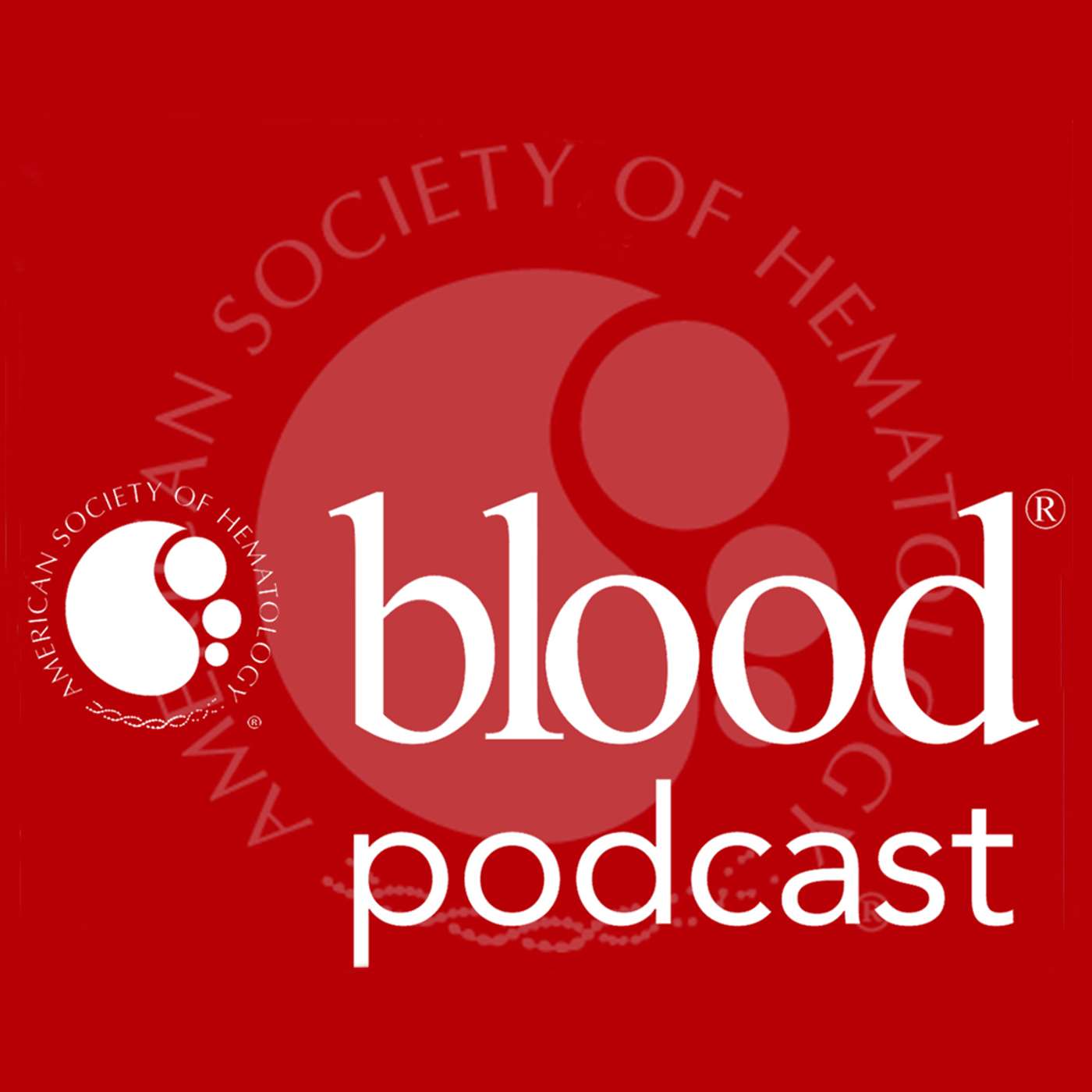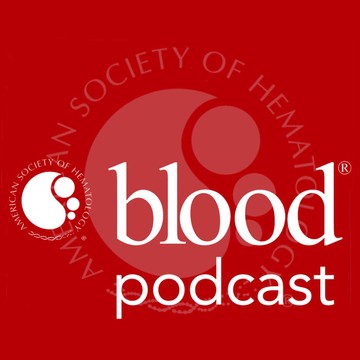

Blood Podcast
American Society of Hematology
The Blood Podcast summarizes content recently published in Blood, the most cited peer-reviewed publication in the field of hematology.
Episodes
Mentioned books

May 19, 2022 • 22min
HLA-DQ heterodimers and transplantation, the genomic landscape of LGL leukemia, and an updated classification of hemochromatosis
In this week’s episode we’ll feature new research demonstrating that certain HLA-DQ heterodimers can help predict clinical outcome following hematopoietic cell transplantation. Next, we’ll review a recent integrated and comprehensive genomic analysis that sheds new light on the molecular characteristics of large granular lymphocyte leukemia and its subtypes. Finally, we’ll review the work of a group that proposes a new and more accessible hemochromatosis classification system based on clinical characteristics and genetic features.

May 12, 2022 • 21min
Role of macrophage NOX2 in alveolar homeostasis, hydroxyurea versus peginterferon alfa-2a in high-risk PV and ET, and the emerging PV treatment landscape
In this week’s episode we’ll discuss an undescribed role for NOX2 in maintaining lung homeostasis through suppression of alveolar macrophage activation. We’ll also cover results of a phase 3 randomized trial that compares the safety and efficacy of hydroxyurea and peginterferon alfa-2a in patients with high-risk polycythemia vera and essential thrombocythemia (or PV and ET, respectively). Finally, we’ll go more in depth on the emerging treatment landscape for PV, and the limits of current clinical trial endpoints.

May 5, 2022 • 20min
Microbiome and CD4 T-cell recovery after allogeneic HCT, and a paradigm shift to CAR T-cells in the second line for large B-cell lymphoma?
In this week’s episode we’ll discuss the effects of intestinal microbial diversity on patient outcomes following allogeneic hematopoietic cell transplant and review the results of three different phase 3 trials comparing CAR T-cells to autologous stem cell transplant in patients with refractory or early relapsing large B cell lymphoma, which have the potential to result in a paradigm shift in the standard of care for second-line therapy.

Apr 28, 2022 • 20min
Canakinumab in SCA, antigen-specific donor T-cells to prevent post-transplant relapse in ALL, and nasopharyngeal mucosal immunity defects in transplanted SCID patients
In this week’s episode, we’ll discuss the efficacy of canakinumab in children and young adults with sickle cell anemia, learn more about the use of donor-derived multiple leukemia antigen specific T-cell therapy to prevent relapse in post-transplant patients with ALL, and discuss the defects in nasopharyngeal mucosal immunity in patients with severe combined immunodeficiency after hematopoietic stem cell transplantation.

Apr 21, 2022 • 17min
Timing (and utility) of CNS prophylaxis in DLBCL, Apollo deficiency in a bone marrow failure syndrome, and GATA1 mutants in congenital anemia
In this week’s episode we’ll cover a retrospective study on the timing of high-dose methotrexate CNS prophylaxis in diffuse large B-cell lymphoma, results of which suggest end-of-treatment delivery might be preferred to earlier administration. The second research article describes how biallelic Apollo variants lead to an inherited bone marrow failure syndrome that resembles dyskeratosis congenita, albeit with normal telomere length. We’ll conclude with research revealing how a rare form of congenital anemia is caused by novel missense mutations in GATA1.

Apr 14, 2022 • 19min
Obinutuzumab plus lenalidomide in advanced follicular lymphoma, mechanisms of anemia in children with malaria, and granulocyte microvesicles for septic shock
In this week’s episode we’ll discuss the efficacy of the obinutuzumab-lenalinomide combination in advanced follicular lymphoma, learn more about the underlying mechanisms of anemia in children infected with Plasmodium falciparum, and discuss how granulocyte microvesicles could improve outcomes in septic shock.

Apr 7, 2022 • 18min
Structural racism and AML survival, promoter competition and hemoglobin switching, and CAR T-cell therapy and high-risk cytogenetics in ALL
In this week’s episode we’ll first cover a research article demonstrating the striking contribution of neighborhood disadvantage to racial and ethnic disparities in survival in patients with acute myeloid leukemia. The second research article provides a model for understanding how disruption of the adult-globin promoter may alleviate promoter competition, thereby reactivating fetal gamma-globin gene expression. We will close with a research article showing that CD19-directed CAR T-cell therapy provides durable remissions in patients with relapsed or refractory ALL across cytogenetic categories, including those patients with high-risk cytogenetics.

Mar 31, 2022 • 19min
Targeting the PBX1-FOXM1 axis in myeloma, SF3B1 mutations in MDS, and pulmonary artery hypertension-associated mortality in β-thalassemia patients
In this week's podcast, we’ll discuss the role of the PBX1-FOXM1 axis in multiple myeloma, learn more about the pathobiology of SF3B1 splicing factor mutations in myelodysplastic syndromes with ring sideroblasts, and discuss mortality rates due to pulmonary arterial hypertension in patients with β-thalassemia.

Mar 24, 2022 • 18min
Novel high-risk subtypes in adult B-ALL, Liso-cel CAR-T therapy in CLL, and liquid biopsies in large B-cell lymphomas
In this week's podcast, we’ll cover a research article that describes two novel subgroups of adult B-cell ALL with high expression of CDX2 and IDH mutations that are linked to poor prognosis. Next, we'll cover results from TRANSCEND CLL 004, a phase 1 study of the CAR T cell therapy, liso-cel, in patients with relapsed or refractory CLL. We will close with research that provides new insights into how analysis of circulating tumor DNA could inform management of patients with aggressive B-cell lymphomas.

Mar 17, 2022 • 19min
Effective treatments for kaposiform hemangioendothelioma, causes of vascular dysfunction in sickle cell patients, and better strategies to select therapy in older adults with AML
In this week's podcast, discuss the efficacy of siroliumus plus prednisolone in kaposiform hemangioendothelioma with the Kasabach-Merritt phenomenon, learn more about the association between SOD2 V16A and vascular dysfunction in patients with sickle cell disease, and discuss the value of geriatric assessment in predicting outcomes in older adults with AML.


